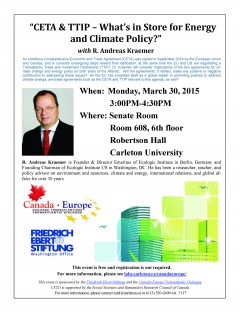Past Event! Note: this event has already taken place.
“CETA & TTIP – What‘s in Store for Energy and Climate Policy?” with R. Andreas Kraemer
March 30, 2015 at 3:00 PM to 4:30 PM
| Location: | Senate Room, 608 Robertson Hall |
| Cost: | Free |
| Key Contact: | Dara Marcus |
| Contact Email: | cetd@carleton.ca |
| Contact Phone: | (613) 520-2600 ext.3117 |
The Friedrich-Ebert-Stiftung and the Canada-Europe Transatlantic Dialogue are pleased to present a lecture with R. Andreas Kraemer (Ecologic Institute, Berlin, Germany) on “CETA & TTIP – What‘s in Store for Energy and Climate Policy?”
The ambitious Comprehensive Economic and Trade Agreement (CETA) between Canada and the EU, and its “Siamese twin,” the Transatlantic Trade and Investment Partnership (TTIP) between the US and the EU, are highly controversial. Proponents of CETA and TTIP hope for increases in trade, value creation, and employment, and promise not only better economic performance, but also an increased weight of the North-Atlantic nations, with their shared values, in a world where power pivots to Asia. Critics fear at least a roll-back of environmental, health, consumer, and social protection, and some claim no less than the end of democracy as we know it. It would be the end of the West and its values, sacrificed on the altar of corporate interests at times of accelerating environmental and social decay.
From what is known about CETA and TTIP: Will they help or hinder climate policy and the transformation of Atlantic energy systems away from dirty, dangerous & increasingly costly fossil and nuclear energy towards clean, safe & increasingly cheap renewable energy? What is good about the agreements, what is bad? Can any good be had without the bad? Can the good be had without CETA or TTIP? The interests and positions bridge the Atlantic; the controversy is not pitting Canadians and Americans against Europeans, instead it is mainly between corporate interests and lobbyists, trade lawyers and negotiators on the one hand, and advocates of public interests and their elected representatives on the other. Trade in energy carriers, investment in energy resources and technologies, and the right and practical possibility of pursuing progressive energy and climate policy can clarify the Atlantic trade and investment controversy in the concrete, and perhaps help resolve it for the common good.

CETD receives support from the Social Sciences and Humanities Research Council of Canada.
